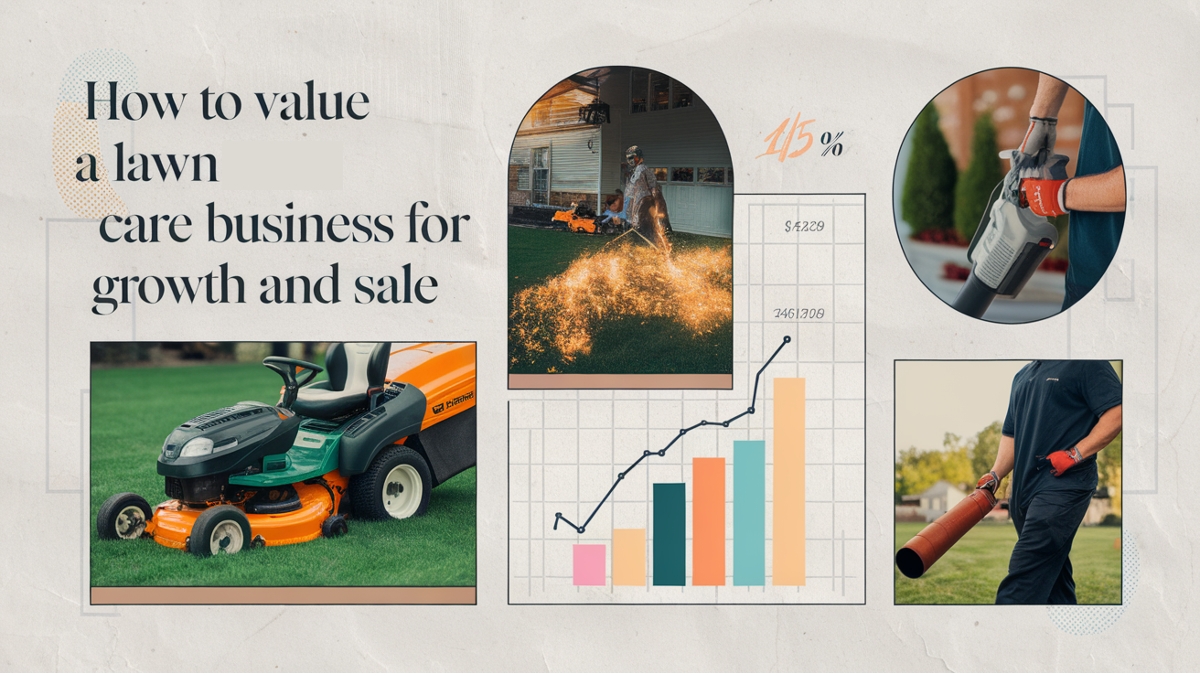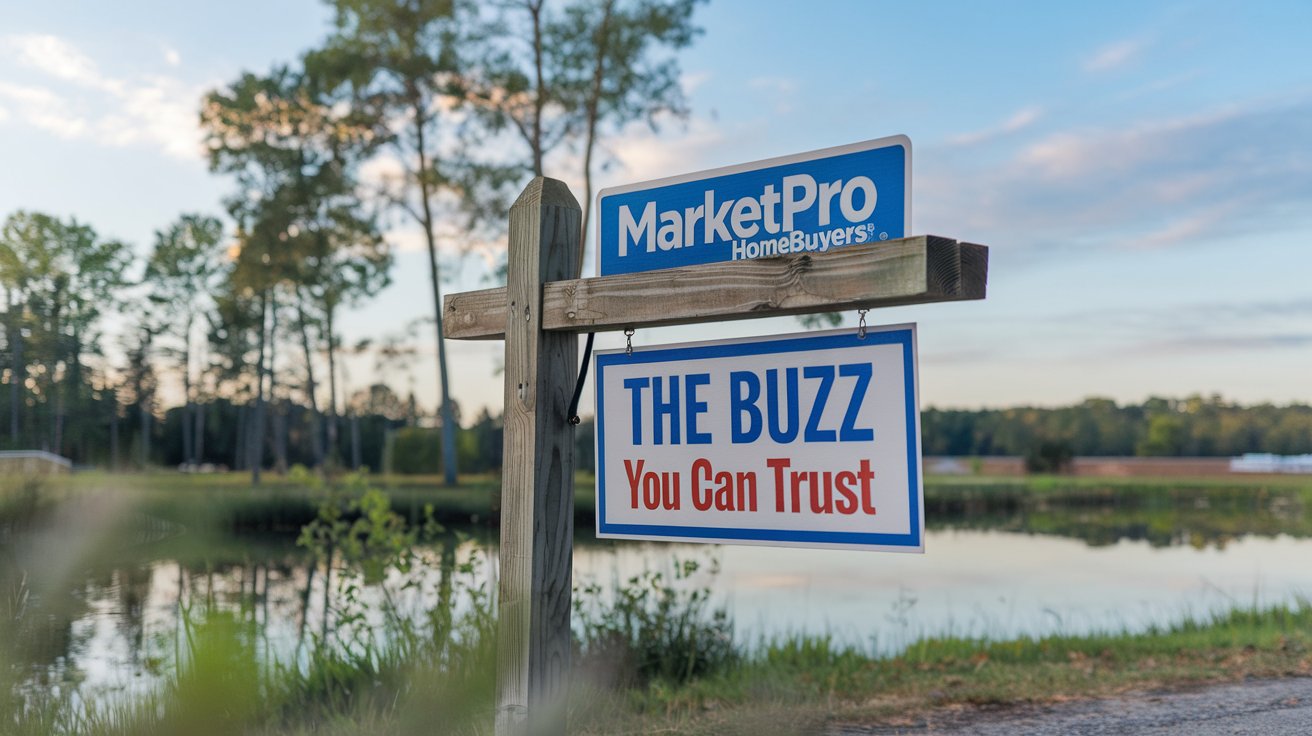Valuing a lawn care business can seem like a daunting task, whether you’re looking to expand, sell, or secure financing. For lawn care business owners, understanding how to value a lawn care business accurately is essential. It ensures you set the right price, maximize growth, and navigate the selling process with confidence. The lawn care industry is growing rapidly, driven by increased demand for eco-friendly services and professional maintenance, so now is an excellent time to assess the value of your business. But how exactly can you determine that value?
In this comprehensive guide, we will walk you through the process of business valuation in the lawn care industry, examining the various methods and key metrics to consider. You’ll gain insight into how industry trends, competition, and operational efficiency play a role in determining the worth of your business. Whether you’re a seasoned entrepreneur or new to the lawn care industry, this guide will provide you with actionable insights for pricing, buying, or selling your lawn care business.
Key Takeaways
Table of Contents
The Importance of Valuing Your Lawn Care Business
Understanding the Role of Valuation in Growth and Sale
Valuing your lawn care business is more than just an exercise in numbers—it’s a critical process that drives your future business decisions, whether you’re looking to grow, secure financing, or sell. The valuation process provides clarity about your business’s current market position, enabling you to plan strategically for the future. If you’re considering selling your business, an accurate valuation ensures that you don’t underprice your hard work or leave money on the table. Conversely, overpricing can turn off potential buyers, making your business more difficult to sell.
For growing businesses, knowing how to value a lawn care business is equally important. It helps you assess your company’s financial health, identify areas for improvement, and make informed decisions about reinvestment. For example, if your business is highly profitable, you may decide to reinvest in equipment, marketing, or expanding your service area to increase future growth potential.
Consider this real-world example: A lawn care business in Florida that relies heavily on one-time services like seasonal cleanups may struggle to maintain consistent revenue during the off-season. By valuing the business correctly, the owner can understand how customer retention strategies (like offering year-round maintenance contracts) will improve the company’s stability and increase its market value.

Common Valuation Methods for Lawn Care Businesses
Three Key Valuation Approaches: Market Comparison, Income-Based, and Asset-Based
When valuing a lawn care business, there are three main approaches you can take: the market comparison approach, the income-based approach, and the asset-based approach. Each method offers a different perspective and focuses on various aspects of your business. Let’s break down these methods in more detail.
Market Comparison Approach
This is one of the most commonly used methods for valuing small businesses, including lawn care services. The market comparison approach involves comparing your business to similar businesses that have recently been sold or are on the market. Industry benchmarks, market comps, and comparable transactions (comps) serve as a basis for determining your business’s value.
For example, if a lawn care business in your area with similar revenue, customer base, and services recently sold for $250,000, you can use that as a benchmark. If your business has similar financials, it might be valued in the same range. However, if your business offers exclusive services, has a larger customer base, or operates in a more lucrative market, your business may command a higher price.
Income-Based Approach
The income-based approach is particularly useful for lawn care businesses that have a steady stream of income, such as recurring revenue from long-term customer contracts. This approach involves estimating the future income potential of the business and applying a multiple to its annual earnings or EBITDA (Earnings Before Interest, Taxes, Depreciation, and Amortization).
Consider this example: If your lawn care business generates $400,000 in revenue and has a net profit of $100,000, the valuation might be based on a multiple of 3 to 5 times that profit. So, your business could be valued at between $300,000 and $500,000, depending on factors such as market demand and growth potential.
Asset-Based Approach
The asset-based approach is based on the total value of a business’s physical assets—such as equipment, vehicles, property, and inventory—minus any liabilities. This method is most commonly used for businesses that rely heavily on tangible assets. For example, if your lawn care business has a fleet of vehicles worth $200,000 and equipment valued at $50,000, your assets would be worth a total of $250,000.
While this approach provides a solid foundation for businesses with substantial physical assets, it may not fully reflect the future earning potential of your business, especially if you’re relying on one-time services or don’t have long-term contracts in place.

Key Metrics for Valuing a Lawn Care Business
Understanding the Most Important Factors in Valuation
Valuing a lawn care business requires a deep understanding of several key metrics, each of which can significantly impact the overall business value. Let’s break down the most important metrics you should focus on when assessing the worth of your lawn care business.
Revenue Streams: Recurring vs. One-Time Services
Revenue is a fundamental factor in determining business value. For lawn care businesses, this can come from a mix of one-time services (such as spring cleanups, fertilization, or aeration) and recurring services (such as regular lawn maintenance contracts).
The key difference between these two types of revenue is that recurring revenue provides a stable income stream, which is more attractive to potential buyers or investors. Buyers are often willing to pay a premium for businesses with a strong base of recurring customers because it offers long-term profitability and reduces the risk associated with seasonality.
For example, a lawn care business that provides bi-weekly maintenance services to 500 clients may be valued more highly than one that only offers seasonal services, even if both generate the same revenue.
Customer Retention and Loyalty
Customer retention is another critical metric in valuing a lawn care business. Businesses with a strong customer base, especially those with long-term contracts, are generally more valuable because they offer predictable revenue. Customer loyalty not only increases the stability of your business but also serves as a strong selling point for potential buyers.
For instance, a lawn care business with 80% customer retention over the past three years will have a higher value than one with a 50% retention rate. This is because consistent customer loyalty reduces the risk for potential buyers and ensures steady income over time.
Profit Margins and Operational Efficiency
Profit margins and operational efficiency are vital for understanding the health of your lawn care business. A high profit margin typically indicates that the business is operating efficiently, managing costs effectively, and generating a solid return on investment. On the other hand, businesses with low margins or inefficient operations are usually valued less.
For example, if your business has an operating margin of 25%, it may be worth more than a similar-sized business with an operating margin of only 10%. Efficient operational practices, such as optimized route planning or equipment maintenance, directly contribute to a higher valuation.

External Factors Affecting Your Lawn Care Business’s Value
How Industry Trends, Market Conditions, and Location Play a Role
External factors—such as industry trends, local competition, and geographic location—can significantly influence your lawn care business’s valuation. These factors are often beyond your control, but understanding them can help you make strategic decisions about pricing, marketing, and potential expansions.
Industry Trends and Market Conditions
The lawn care industry is projected to grow at a steady rate, driven by increasing consumer demand for professional services, eco-friendly options, and technology integration (e.g., smart irrigation systems). As the industry grows, the value of businesses within it can increase as well, especially if you’re well-positioned to capitalize on these trends.
For example, a lawn care business that offers organic treatments or sustainable lawn care practices may be able to command a premium in a market that is increasingly concerned with environmental issues.
Competition in Your Local Market
Local competition is another important consideration. In highly competitive markets, it may be more difficult to command high prices or maintain a large market share. Alternatively, in regions with limited competition, your business may be valued more highly due to its dominant market position.
If your lawn care business operates in a saturated market, you may need to differentiate yourself with unique services, such as specialized lawn care packages or bundled services, to maintain competitive advantage.
Geographic Location
Your location plays a crucial role in determining your business’s value. Businesses in areas with high population densities, favorable weather conditions, and higher average income levels tend to have higher values. Urban and suburban areas with a higher demand for lawn care services will increase the likelihood of higher revenue and profits, which in turn boosts business valuation.
How to Avoid Common Mistakes in Lawn Care Business Valuation
Overpricing and Under pricing: The Risks of Misjudging Your Business’s Worth
Inaccurate business valuations can have serious consequences, especially when it comes to selling or expanding your lawn care business. Overpricing can scare off potential buyers, while under pricing can result in lost profit or missed opportunities. Let’s explore the most common mistakes business owners make and how to avoid them.
Overpricing Your Business
Many lawn care business owners overestimate the value of their business based on emotions or inflated expectations. Overpricing can make it difficult to find buyers, and even if you do find a buyer, the sale may fall through due to disagreements on price.
To avoid overpricing, it’s important to base your valuation on industry benchmarks, recent sales data, and accurate financial reports. Getting a professional business appraiser involved can help ensure you arrive at a fair and realistic price.
Under pricing Your Business
On the flip side, some owners undervalue their business out of a desire for a quick sale. Under pricing your business means leaving money on the table and potentially selling it for less than it’s worth. Understanding the true value of your business allows you to set a price that reflects its growth potential, market position, and financial stability.
Professional vs. DIY Valuation: Which Is Right for You?
Weighing the Pros and Cons of Both Approaches
When it comes to business valuation, you have two options: you can either perform a DIY valuation or hire a professional appraiser. Both approaches have their advantages and disadvantages, so it’s important to consider your specific needs and circumstances.
DIY Valuation
If you’re comfortable with numbers and have access to accurate financial data, performing a DIY valuation may be a cost-effective option. You can use online tools, industry comps, and financial ratios to estimate your business’s value.
However, a DIY valuation can be subjective, and you may miss out on important market data or overlook intangible assets. This approach is best suited for smaller, less complex businesses with relatively straightforward financials.
Professional Valuation
For businesses with more complex financial structures or for those seeking to sell at a premium, hiring a professional appraiser can provide a more accurate and unbiased estimate. A certified business appraiser has the expertise to evaluate your business from all angles, including intangible assets, industry trends, and market dynamics.
What to Do Once You Have Your Business Valuation
After you’ve conducted a business valuation for your lawn care business, you now hold the key to making well-informed decisions about its future. A business valuation provides you with a snapshot of your company’s worth, and this information can serve as a foundation for significant next steps—whether you’re planning to grow, sell, or invest. As a lawn care business owner, you may face unique challenges when making these decisions. However, with a clear picture of your valuation, you can confidently navigate your path forward.
For example, if you’re considering selling your lawn care business, understanding its true value is paramount to setting realistic expectations with potential buyers. If you’re planning to expand, knowing your valuation will guide where and how to invest your resources effectively. Alternatively, if you’re looking to retain ownership but seek ways to improve profitability, a valuation can help you identify key areas to enhance. Ultimately, the value of your business plays a pivotal role in driving future success and aligning your strategies with achievable goals.
Strategic Decisions: Grow, Sell, or Invest in New Services
Once you’ve grasped your business valuation, you can confidently determine the best path forward based on your goals. Here are three major avenues you may want to explore:
1. Growing Your Lawn Care Business
If your valuation indicates strong profitability and potential for future growth, expanding your business might be the logical next step. A robust valuation allows you to analyze the financial health of your business, helping you understand which areas could benefit from further investment. Whether it’s expanding your customer base, upgrading equipment, or hiring more staff, a comprehensive valuation will help you allocate your resources effectively.
In real-world scenarios, business owners who strategically use their valuations often experience enhanced growth. Take, for example, companies like TruGreen, a well-established lawn care service provider, which uses detailed performance data to consistently expand their operations. Their business valuation is used not only to guide mergers and acquisitions but also to understand customer demand, pricing strategies, and service expansion opportunities. By leveraging their valuations, TruGreen has been able to refine its strategies for steady growth and profitability.
2. Selling Your Lawn Care Business
If you plan to sell your lawn care business, a valuation can help you set a fair asking price and negotiate the best terms. Knowing your business’s value provides you with the upper hand during the negotiation process and ensures you don’t undersell. Additionally, it gives prospective buyers a clear understanding of what they’re purchasing, which could expedite the sale process.
For instance, suppose you’re a lawn care business owner who has built a strong local customer base and developed unique service offerings. A detailed business valuation can help you highlight these selling points to buyers. By presenting well-documented financials, contracts, and service performance data, you can showcase the long-term value of your company. A successful sale often depends on both having a clear valuation and being able to back it up with reliable data that appeals to prospective buyers.
3. Investing in New Services or Diversifying Your Offerings
A valuation can also guide you when considering whether to introduce new services or diversify your business. For example, if your lawn care business valuation highlights areas with low customer retention rates or underperforming services, you might choose to invest in improving these aspects. Alternatively, if the valuation reveals strong growth in specific areas, such as organic lawn care or pest control, you might expand in those directions.
Many lawn care businesses, like Lawn Doctor, use valuations to explore new growth avenues, such as offering pest control or landscape design alongside traditional lawn care. These expansions can create new revenue streams and further solidify the brand’s presence in the market. With a solid valuation, you can determine whether the market conditions are favorable for such moves or if it’s better to focus on optimizing existing services before adding new ones.
Key Factors to Consider After Your Business Valuation
Decision Area | Insights for Lawn Care Business Owners |
|---|---|
Business Growth | Invest in high-return areas based on your business’s strengths. |
Selling Your Business | Use your valuation to set a realistic asking price and negotiate better terms. |
New Service Investment | Leverage valuation data to prioritize expanding services with high demand or profitability. |
Conclusion: Leveraging Your Business Valuation for Long-Term Success
Valuing your lawn care business is an essential step in making informed decisions, whether you’re looking to grow, sell, or invest. A solid understanding of your business’s worth ensures that your strategies align with your long-term objectives. By recognizing the value of your company, you can avoid potential pitfalls, maximize profitability, and chart a course for future success. Whether you’re a small business owner or looking to scale, a clear business valuation will serve as your guide in navigating critical business decisions with confidence.
For example, imagine you are at a crossroads, unsure whether to invest in more service trucks or open a new office location. By analyzing your business valuation, you may discover that increasing operational efficiency and expanding into high-demand areas could yield better returns than geographical expansion at this stage. This insight directly impacts your decision-making and positions your lawn care business for sustainable growth.
The key information gathered from your business valuation, you can ensure that your lawn care business is positioned for success, whether you choose to grow, sell, or diversify your services.
Frequently Asked Questions
How to calculate lawn care pricing?
Pricing for lawn care services should factor in labor, equipment, and overhead costs, along with local market rates. Be sure to also consider seasonal variations in demand.
How much can I sell my lawn business for?
The sale price depends on several factors, including revenue, profit margins, customer retention, and the market value of assets. A professional valuation can help you set an accurate price.
How much is the lawn care industry worth?
As of March 2025, the lawn care industry is worth over $100 billion and continues to grow, driven by an increased demand for professional landscaping services and sustainable practices.
What is a good profit margin for lawn care?
A good profit margin in lawn care typically ranges from 15-30%, depending on the business’s scale, operational efficiency, and customer base.
What are common valuation methods for lawn care businesses?
The three common methods are market comparison, income-based, and asset-based valuation. Each provides unique insights into your business’s worth.
How does customer retention affect business valuation?
A loyal customer base increases recurring revenue and lowers risk, both of which enhance your business’s overall value.

Robert Martin is a passionate blogger and versatile content creator exploring the intersections of personal finance, technology, lifestyle, and culture. With a strong background in financial literacy and entrepreneurship, he helps readers make smarter money moves, build sustainable side hustles, and achieve financial independence.
Beyond finance, Robert shares his insights on home decor and gardening—offering practical ideas for creating beautiful, functional living spaces that inspire comfort and creativity. He also dives into the dynamic worlds of sports and celebrity news, blending entertainment with thoughtful commentary on trends that shape today’s pop culture.
From decoding the latest fintech innovations to spotlighting everyday success stories, Robert delivers content that’s informative, relatable, and actionable. His mission is to empower readers to live well-rounded, financially confident lives while staying inspired, informed, and ahead of the curve.




